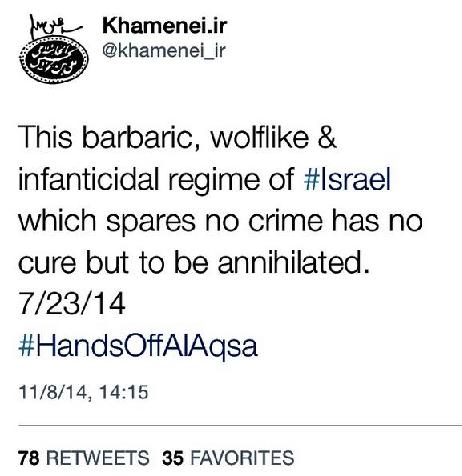
With the weakening of sanctions several distinguished institutions discern that the Iranian economy has turned the corner. A report by the Foundation for Defense of Democracies [FDD] “found the country in the midst of a moderate economic recovery, after bottoming out in the 2013/14 fiscal year (ending March 20, 2014).” The report adds, “A collapse in nuclear negotiations and a quick re-imposition of sanctions would weaken growth substantially, but the resulting recession would be far less extreme than in the original imposition of sanctions in 2012.”
A comprehensive report by the International Monetary Fund in April, 2014, [from which the FDD report may have drawn] offered a similar conclusion, forecasting economic growth and lower inflation. The report also highlights the fact that European countries are scaling up their commercial activities with the Islamic Republic and appear to be well on the path to abandoning sanctions altogether. The United States too has taken steps to ease its own more rigorously enforced sanctions.
The loosening of sanctions does not appear to have had much impact on the direction of Iran’s nuclear program. The United Kingdom’s Sunday Times reports “Iran could have five times more advanced centrifuges capable of producing weapons-grade uranium than it has previously admitted, according to the former deputy chief of the UN nuclear watchdog, Olli Heinonen.” Heinonen added, “Iran could have up to 5,000 IR-2m centrifuges rather than the 1,008 it has claimed. The IR-2m devices are up to five times more effective in enriching uranium than older IR-1 types.”
Even Suzanne Maloney of the Brookings Institute, a vocal proponent of a negotiated solution, who has been dismissive of Israeli Prime Minister Benjamin Netanyahu’s harder line toward Iran, described the new outreach effort by the Obama administration reportedly through a secret letter, as “spectacularly ill-conceived.” Maloney emphatically added,
“After all, only the most naïve and uninformed observer of Iran would believe that a personal appeal from Obama would sway the Supreme Leader in a positive fashion… Khamenei’s mistrust and antipathy toward Washington has been a consistent feature of his public rhetoric through the 35-year history of the Islamic Republic. He has described Washington with every possible invective; he indulges in Holocaust denial and 9/11 conspiracies; and he routinely insists that the United States is bent on regime change in Iran and perpetuating the nuclear crisis. These views are not opportunistic or transient. Anti-Americanism is Khamenei’s bedrock, engrained in his worldview, and as such it is not susceptible to blandishments — particularly not from the very object of his loathing.”
The Iranian based Islamic Republic News Agency [IRNA] reported on a Der Spiegel On-line interview with Iran’s nuclear negotiator, Majid Takht-e Ravanchi, in which he claimed that Iran’s nuclear capabilities cannot be reversed.
Obama administration no longer believes that Netanyahu would launch a preemptive strike on Iran’s nuclear facilities in order to keep the regime in Tehran from building an atomic arsenal. “ It’s too late for him to do anything. Two, three years ago, this was a possibility. But ultimately he couldn’t bring himself to pull the trigger. It was a combination of our pressure and his own unwillingness to do anything dramatic. Now it’s too late.”
It has been posited that this disclosure was not meant simply as a slap at Netanyahu, but also as a signal to the Iranians that they need not fear pre-emptive Israeli action; Washington is firmly in control of the process.
The actions of Iran and its proxies signal an increasingly aggressive regional policy. In September, Shi’ite Houthi rebels seized control of Yemen’s capital and continue to consolidate their control. This means that Israel now faces Iranian threats from both near and far on three sides. In the south, Hamas and Islamic Jihad form the near threat in the Gaza Strip, while Yemen serves as a potential base for Iran with access to the Red Sea. To the east there is the near threat of Hamas and other Iranian-backed groups initiating disturbances in the West Bank and further off there is Iran itself. To the north, Hezbollah, a subsidiary of Iran’s Revolutionary Guards, sits on Israel’s border with a reported 100,000 rockets. The Iranian-backed Syrian regime provides further potential support. An Iranian strategy of encircling Israel appears to be proceeding apace.
Meanwhile the Jerusalem Center for Public Affairs [JCPA] reprinted the tweets by the Iranian Supreme Leader,
“This barbaric, wolflike & infanticidal regime of #Israel which spares no crime has no cure but to be annihilated.”
Threats don’t come much more bluntly than that.
